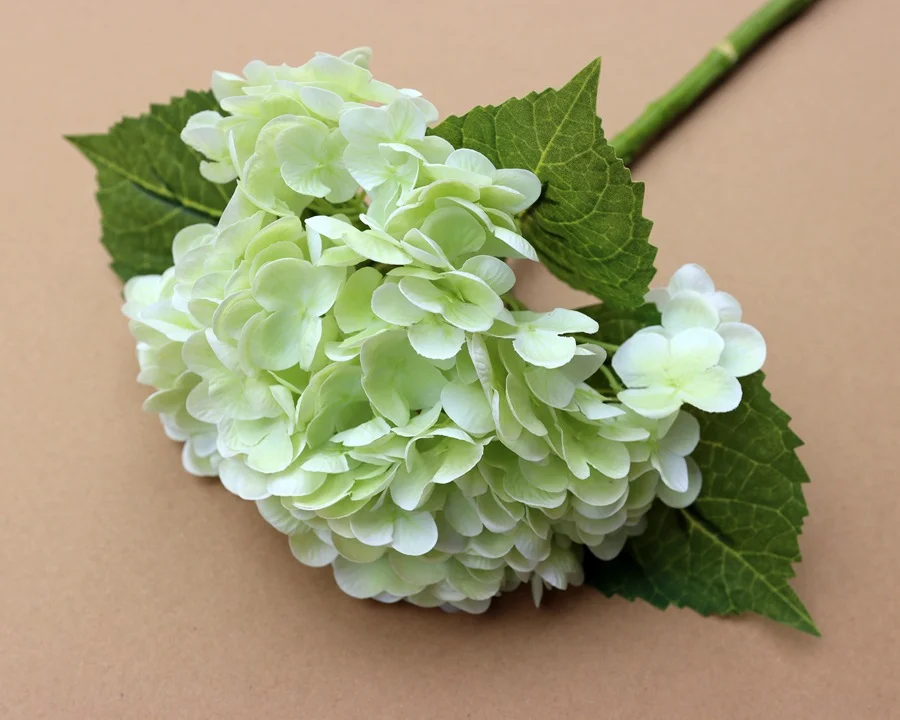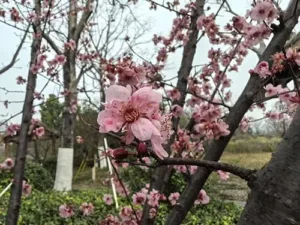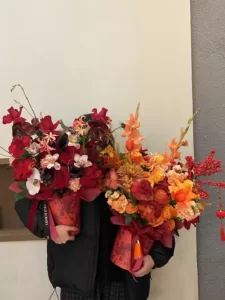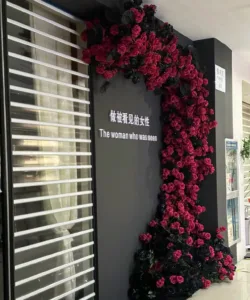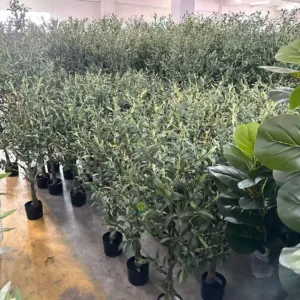Benefits of importing artificial flower from China
The artificial flower industry, often referred to as the “permanent botanicals” industry, involves the production and sale of floral products made from materials that are designed to last for a long time without fading or wilting. These can be made from various materials like silk, plastic, latex, or dried natural materials.
Artificial flowers offer the beauty and aesthetic appeal of real flowers, but with significantly less maintenance, making them a popular choice for decor in homes, businesses, and event settings. They are also beneficial for those with allergies to real flowers, and their longevity makes them a cost-effective choice for many.
China is a global leader in the artificial flower industry, known for its wide variety, high production volume, and competitively priced products. There are so many artificial flowers manufacturers in china, Thanks to advanced manufacturing processes, the quality of artificial flowers from China has improved greatly over the years, further driving their global demand.
The global market for artificial flowers has seen consistent growth, propelled by factors like rising consumer interest in durable and low-maintenance decor, an increase in online sales channels, and the improved realism of artificial flowers due to advancements in manufacturing techniques.
For importers, the artificial flower industry presents lucrative opportunities due to these growth trends and the potential for high profit margins.
.webp)
Major regions in China that produce artificial flower
Certain regions in China are known for their significant contributions to the artificial flower industry:
1. Yiwu, Zhejiang Province:
Yiwu is often dubbed as the world’s capital of small commodities. The Yiwu International Trade Market, specifically District 1, has a massive section dedicated to artificial flowers. Numerous manufacturers and wholesalers here offer a vast variety of artificial flowers at competitive prices.
2. Guangdong Province:
This southern province, particularly the city of Guangzhou, is another major hub for artificial flower production. The Guangzhou International Artificial Flower wholesale market is known for its wide range of high-quality artificial flowers.
3. Shandong Province:
Certain areas within this province, such as the city of Qingdao, are known for producing high-quality silk flowers.
4.Tianjin
Tianjin is another significant region in China known for its artificial flower industry. It’s especially renowned for producing economic silk flowers. Tianjin, being a major port city in northern China, also has the advantage of excellent logistics and transportation infrastructure, making it convenient for the export of these goods.
In sum, the provinces of Zhejiang, Guangdong, Shandong, and Tianjin are all critical to China’s artificial flower production.
Variety of artificial flowers available
China’s artificial flower industry is diverse and expansive, offering a wide variety of options for importers. Here are some types of artificial flowers you can import from China:
1. Silk Flowers: Made from silk or similar materials, these are highly realistic and delicate. They’re used in home decor, weddings, and other events.

2. Plastic Flowers: These are durable, bright, and easy to clean, making them suitable for outdoor use and in areas where durability is key.

3. Latex Flowers: Made from flexible latex, these flowers often have a more realistic feel compared to silk or plastic flowers. They are used in high-quality arrangements and displays.

4. Dried and Preserved Flowers: These are natural flowers that have been treated to retain their beauty. They have a unique aesthetic and are used for a variety of purposes, including home decor and crafting.
5. Paper Flowers: Made from different types of paper, these are often used in crafts, decor, and displays. They can be highly detailed and delicate.
6. Foam Flowers: Made from foam, these are lightweight, durable, and often used in bridal bouquets and centerpieces.
7. Fabric Flowers: These are made from various types of fabric and are often used in crafting and apparel.
8. LED Flowers: These artificial flowers include small LED lights, adding a unique aesthetic to events and home decor.
9. Solar Flowers: These are typically used for outdoor decor. They have a solar panel that powers an integrated light.
10. Artificial Flower Arrangements: These are pre-arranged artificial flowers, often including a vase or container. They’re used for decor and as gifts.

Each type has its own unique qualities and potential uses, allowing importers to cater to a wide range of customer preferences and needs.
Factors consideration when import artificial flower from china
When importing artificial flowers from China, there are several key factors that potential importers should take into consideration:
1. Quality: The quality of the flowers can vary significantly from one supplier to another. It’s essential to request samples and check for elements like the quality of materials, the craftsmanship, the color fastness, and the overall finish of the product.
2. Price: While price is a major consideration, it’s crucial not to compromise on the quality of the flowers. Importers should negotiate prices but also bear in mind that extremely low prices might reflect substandard quality.
3. Minimum Order Quantity (MOQ): Suppliers often set a minimum order quantity, which is the least amount of product you must purchase in a single order. It’s important to find a supplier whose MOQ aligns with your budget and demand.
4. Supplier Reliability: It’s crucial to verify the reliability of the supplier. Check their certifications, ask for references, check their online reviews, and possibly even conduct an onsite visit.
5. Product Range: A supplier with a wide variety of flowers can be beneficial, particularly if you want to offer your customers a broad selection.
6. Delivery Time: Check how long the supplier takes to deliver an order. A longer lead time could impact your business operations.
Researching potential suppliers
Finding reliable suppliers from China can be a critical step in the import process. Here are some strategies and platforms to find suppliers:
- Online B2B Marketplaces: Websites such as Alibaba, Made-in-China, and Global Sources are vast online marketplaces where you can find thousands of manufacturers and trading companies. These platforms offer various filters to narrow down your search based on product category, supplier location, minimum order quantity, and more.
- Trade Shows and Expos: Trade shows offer a unique opportunity to meet suppliers face-to-face, assess product quality, and build relationships. The Canton Fair, for instance, is one of the largest trade shows in China, where thousands of suppliers from diverse industries showcase their products.
- Sourcing Agents: Hiring a sourcing agent can be beneficial, especially for businesses new to importing. Sourcing agents have local knowledge and expertise, can help find suppliers, negotiate prices, manage logistics, and ensure quality control.
- Business Directories: Online business directories like China Business Directory, China Suppliers Directory, or Kompass have listings of Chinese businesses, including manufacturers and exporters.
- Social Media and Online Forums: Platforms like LinkedIn, Facebook, and online import/export forums can also be useful for finding suppliers and getting peer recommendations.
- Visit China: If feasible, visiting China and exploring manufacturing hubs can be an excellent way to find potential suppliers. Cities like Yiwu, Guangzhou, Shenzhen, and others have wholesale markets and factories.
Verifying supplier reliability
When you’ve found potential suppliers, it’s important to verify their reliability. You can do this by checking their business license, asking for references, reading reviews, asking for samples, and even conducting factory audits or inspections.
Here are some steps an importer can take to verify their suppliers:
1. Business Verification: Check if the supplier is a legally registered business. Ask for their business license and registration number. You can often verify this information through local government websites or third-party verification services.
2. Certifications: Ask the supplier for relevant industry certifications that prove they meet specific quality, safety, or environmental standards. These might include ISO certifications, CE marks for products sold in Europe, or the BSCI for social compliance.
3.Communication and Responsiveness: A responsive supplier who communicates well is often more reliable. Take note of how timely they respond to your inquiries and their effectiveness in problem-solving.
4.Factory Audits: If possible, consider hiring a third-party inspection company to conduct a factory audit. This can provide valuable insights into the supplier’s capacity, production capabilities, quality control procedures, and more.
Getting Samples
obtaining samples from your supplier is crucial in the import process for several reasons:
1. Assess Quality: Samples allow you to evaluate the quality of the product firsthand. You can check materials, craftsmanship, durability, and other features to ensure they meet your expectations and standards.
2. Verify Product Details: With a sample, you can confirm that the product matches the specifications and descriptions provided by the supplier. This includes colors, sizes, materials, and functionality.
3. Test Market Response: If you’re importing a new product, samples can help you test the market response. You can get feedback from potential customers or clients before making a large order.
4. Prevent Misunderstandings: Having a physical sample can help prevent misunderstandings between you and the supplier about product expectations. 5. Supplier Evaluation: The process of obtaining a sample can also give you insights into the supplier’s reliability, such as their communication, speed of delivery, and packaging.
While getting samples might add to your initial costs, it can save you from bigger problems later on, such as receiving a batch of low-quality products or products that do not meet your customers’ expectations. So, it is generally a wise investment.

Negotiating the Price and Terms
Negotiating price with a supplier involves careful consideration of several factors:
1. Understanding Market Price: Before negotiations, research the market prices for similar products from different suppliers. This knowledge can be a strong bargaining chip during negotiations.
2. Order Quantity: Higher order quantities typically provide more room for price negotiations. Suppliers are usually willing to offer discounts for bulk purchases.
3. Long-Term Relationship: If you plan on building a long-term relationship with the supplier, express this intention as they may be more willing to offer better prices for the prospect of steady future business.
4. Product Quality: Remember that the price often reflects the quality of the product. While negotiating for a lower price, make sure not to compromise on the quality of the goods.
5. Payment Terms: Flexibility in payment terms can sometimes influence price. If you can offer upfront payment or shorter payment terms, a supplier might be more inclined to lower the price.
6. Shipping and Packaging: Consider the costs of shipping and packaging in your negotiations. These costs can significantly impact the overall cost of your order.
7. Customization: If you’re requesting customizations or modifications to the standard product, this will likely affect the price. Be prepared for potential added costs here.
Remember, negotiation is a two-way street. The goal should be to reach a win-win

There are several payment methods that importers can choose when doing business with Chinese artificial flowers suppliers:
1. Telegraphic Transfer (T/T): Also known as a bank or wire transfer, this is one of the most common methods of payment. Typically, the importer pays a percentage of the total amount in advance, with the remainder paid once the goods are shipped or received.
2. Letter of Credit (L/C): This is a commitment by the importer’s bank that payment will be made to the supplier upon meeting specified criteria, usually after providing proof of shipment. It’s widely used for large transactions as it offers protection to both parties.
3. PayPal or Xtransfer: For small transactions or samples, PayPal can be a convenient method, although it’s not commonly used for large orders due to higher fees.
4. Western Union: Used occasionally for small transactions, but less secure for larger payments as there’s little recourse if something goes wrong.
5. Escrow Services: In an escrow service, the payment is held by a third party until the buyer confirms receipt of the goods in the agreed condition
Quality Control and Inspections
Quality control is an essential aspect of importing goods from China. Here are some steps to ensure the quality of your goods:
1. Define Quality Standards: Clearly define your quality standards and expectations to the supplier. The quality standards should be included in your contract or purchase order.
2. Request Production Samples: Before the full production run, ask the supplier to provide a production sample. This sample should represent what the final product will look like and allows you to verify if the product meets your quality standards.
3.Pre-shipment Inspection: After the goods have been produced, but before they are shipped, conduct a pre-shipment inspection. This inspection can confirm the quantity of items, packaging details, and quality of the finished goods.
4. Hire a Third-party Inspection Company: If you’re not able to conduct these inspections yourself, consider hiring a third-party inspection company. These companies specialize in on-site product inspections and can provide detailed reports on the quality of your goods.
Remember, the aim of quality control is not just to detect problems, but to provide feedback to the production process to prevent future issues. It’s essential to maintain open communication with your supplier about your quality expectations and any issues that arise.

Shipping and Logistics
Shipping is a crucial part of importing goods from China. Here’s a simplified step-by-step guide on how to handle shipping:
1. Decide on the Shipping Method: The first decision to make is whether to ship by sea, air, or rail. The choice largely depends on the nature of your goods, your budget, and how quickly you need the goods. Sea freight is usually the cheapest but takes the longest, while air freight is the fastest but also the most expensive.
2. Choose Incoterms: Incoterms (International Commercial Terms) define the responsibilities of the buyer and the seller in the shipping process. They determine who is responsible for the cost and risk at each stage of the shipping process. Commonly used Incoterms are EXW (Ex Works), FOB (Free on Board), and CIF (Cost, Insurance, and Freight).
3. Hire a Freight Forwarder: A freight forwarder can handle the complex logistics of shipping, including arranging transport, handling customs documentation, and ensuring that the goods arrive safely at your destination. It’s usually easier and more reliable to work with a freight forwarder, especially for those new to importing.
4. Prepare Necessary Documentation: Shipping internationally requires several documents such as the Bill of Lading, Commercial Invoice, Packing List, and possibly others depending on your product and the import regulations in your country. Your freight forwarder can usually assist with this.
5. Customs Clearance: Once the goods arrive at the destination country, they need to clear customs before they can be delivered to you. You’ll need to pay any applicable import duties and taxes. A customs broker can assist with this process.
6. Delivery to Destination: After clearing customs, the goods will be delivered to your designated location. This is typically arranged by your freight forwarder.

Frequently Asked Questions
Is artificial flower business profitable?
The artificial flower business can be profitable because of the growing market demand.
What are the main challenges in the artificial flower business?
The artificial flower business confronts several main challenges, including intense market competition, high requirements for product quality and innovation, and fluctuating raw material prices.
How to balance the cost and quality of artificial flower products?
Balancing the cost and quality of artificial flower products requires a comprehensive approach that covers various aspects from raw materials to production processes and supplier management. Here are some ways to achieve this balance:Buy in bulk,Establish long – term supplier relationship to get more favorable terms,Manage inventory effectively etc..
Where do silk flowers come from?
China’s long history of craftsmanship has given birth to countless artistic innovations, and one of the most fascinating is the creation of artificial flowers.
How to find a suitable artificial flower supplier?
When looking for a suitable artificial flower supplier, you need to comprehensively consider various factors and conduct careful research and evaluation,so here we have another blog help you to realize :
How to Find a Suitable Artificial Flower Supplier

Conclusion
Importing artificial flowers from China is a complex process but it can be highly rewarding if executed properly. Understanding the industry landscape, the various types of flowers available, the key production regions, and the market trends are crucial first steps.
Identifying and verifying reliable suppliers are critical next steps, followed by careful negotiations around price, terms of agreement, and defining clear quality standards. Obtaining product samples is an important aspect of this process, ensuring that the final product will meet your expectations.
Managing payment options effectively, ensuring stringent quality control, and handling the shipping and customs logistics efficiently are key to a successful import process.
However, despite the challenges, with the right knowledge, resources, and diligence, importers can benefit significantly from the vast variety and cost-effective artificial flowers produced in China. It’s about building reliable partnerships, ensuring quality products, and delivering value to the end customers.
Plantifya focused on wholesale all kinds of artificial flower and plants, if you have any demand for fake flower, artificial greenery plant,welcome to contact us for further cooperation.
